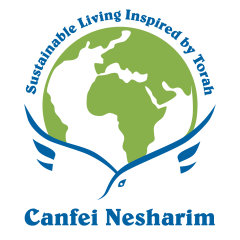When I grew up we always sorted trash: our trash, the synagogue’s trash, even the neighbors’ trash! This was the 1980’s – so not only did we sort trash, as these were the days before curbside pickup, we stored everyone’s recycling in our garage and brought it to the recycling center ourselves. We had recycling bins built into the kitchen. I grew up without disposable dishes, and my mom used re-usable mesh bags for produce shopping back when she had to get them from a specially catalogue.
From a young age I was taught to care for the world we live in and to treasure the gifts that G-d gave us. I was taught to be careful with natural resources and not to waste. But I never identified myself as an environmentalist – this was just how we lived. I did identify as Orthodox Jewish, though. I grew up going to day school, living in a modern Orthodox community, keeping kosher and Shabbat.
Then I went to college and learned the word “environmentalist.” I learned that many of the ideas and practices I had grown up with were not the norm, but were now slowly creeping into everyday life. I searched for a community of like-minded individuals where I could learn more about how to protect and care for the environment. And I worked to bring my environmental ideals to my school (Stern College). I started a campaign to increase recycling. The bins were present, but more often filled with trash than cans. A friend and I revived the environmental club and worked with a team to try to convince students to recycle. While some of my peers were receptive, many ignored the events and the pleas to recycle. I could not understand why our ideas were not gaining more traction in the university – after all, to me, the connection between Judaism and the environment had been engrained as a way of life.
Then one day, a friend, tired of arguing with me said: “If you show me that Judaism says to recycle, I will commit – it is not enough to say G-d created the world. He also said to conquer it. Where does it say to recycle?” I took the challenge – I began to learn more about the basic sources that speak to environmental consciousness – I looked through many texts I had read before but this time in a new light. Where did G-d speak to us about taking care of the world? The more I searched, the more I realized the answer is in the song we all learn as children. “Up, up, down, down, left, right and all around – that’s where He can be found.” If the Creator is everywhere, that means the environmental message is present everywhere too – even where least expected.
In the first chapter of the Torah, G-d puts Adam and Chava on this earth and says “pru urvu umilu et ha aretz vi kivshuha.” The common translation is “be fruitful and multiply and have dominion over the earth.” The word dominion is translated from the Hebrew word “urdu.” Rashi, the foremost commentator on the Bible notes that there are actually two roots to the word “urdu” in Hebrew. The most common understanding is “yored” – “to rule.” However, there is also the root “yarad” – “to descend.” Says Rashi, G-d chose this word for a reason. If humans take care of the earth and show the stewardship that G-d models for humans in the second chapter of Genesis, humans will be able to control their surroundings and be able to improve how they live. However, Rashi explains: the choice of this word is to teach us that if we fail in our stewardship, then we will “descend,” and the earth and nature will have mastery over us.
These discoveries became the foundation of Canfei Nesharim: Sustainable Living Inspired by Torah, a group I formed almost fifteen years ago with other like-minded individuals to educate and inspire others to understand that environmental consciousness is an important part of a Torah-lifestyle. Since our launch, we have worked to strengthen the understanding of how traditional Jewish texts speak to sustainability in our times. Tu B’shvat is the perfect time to reconnect to nature, a time when the sap in the trees starts to rise, the sign of growth for the coming spring and a time to learn how the latest “trend” is actually an age-old Jewish ideal.
http://jewinthecity.com/2016/01/how-i-became-an-orthodox-jewish-environmentalist/
